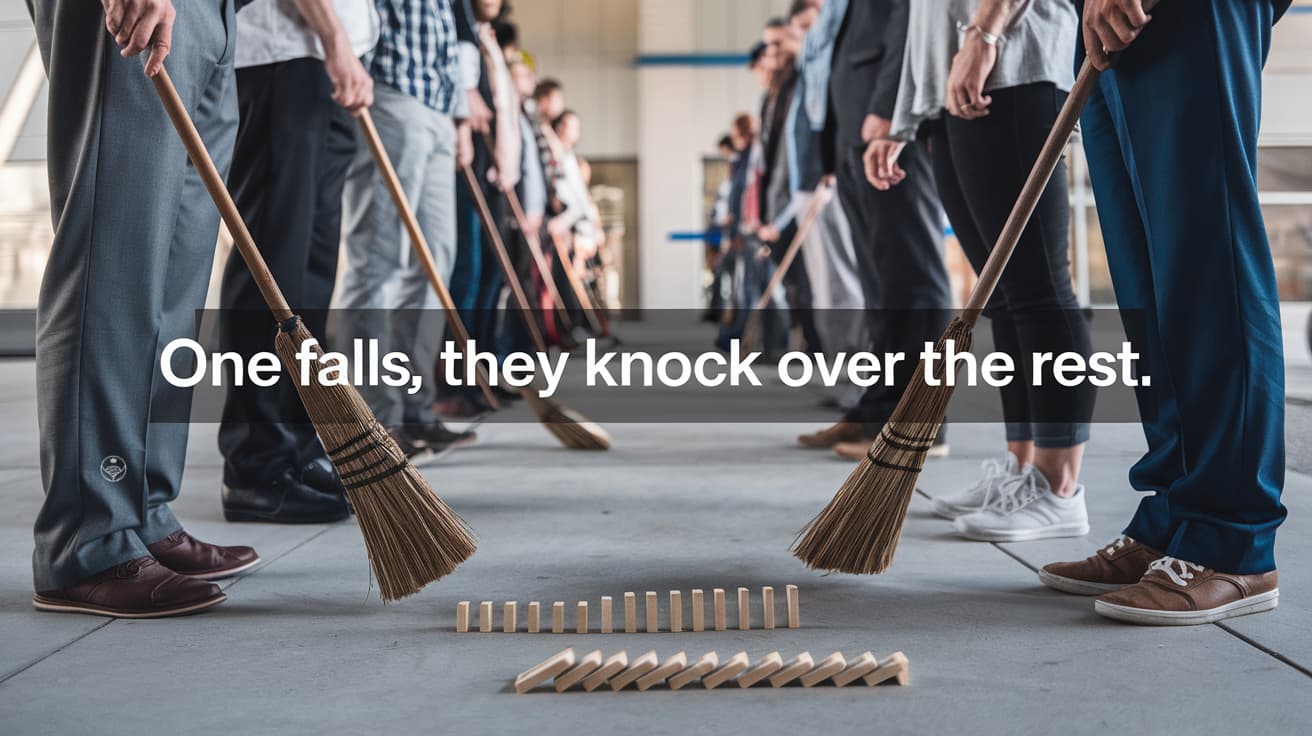
Accountability and Neurodivergence: Owning Your Sh!t Without Excuses
We all mess up. No exceptions. Neurodivergent brains? Well, they just add a few extra twists and turns to the journey. Whether it’s ADHD impulsivity, autistic literalness, or executive dysfunction tripping you up, accountability in neurodivergent individuals can sometimes feel like an impossible ask. But here’s the thing; accountability isn’t a punishment. It’s empowerment.
Let’s take a step back. Imagine spilling red wine on someone’s cream sofa. The panic kicks in. Maybe you freeze up, or maybe you blurt out some half-baked excuse about slippery glasses. That’s human. But accountability is what happens next: “I’m sorry. That was my mistake. How can I make it right?” No excuses, no finger-pointing, just ownership. And here’s the kicker: it’s not just for others. It’s for you. Owning up frees you from the exhausting cycle of avoidance, shame, and defensiveness.
Why Accountability Matters: Cause, Effect and Growth
Life is like a line of dominoes. Every action, or inaction, knocks over another piece, sometimes with results you didn’t see coming. You forget a friend’s birthday? That’s not just a date missed; it might tip over into them feeling undervalued. Say you tell a white lie to cover your forgetfulness. Now you’ve pushed over another domino, trust takes a hit, and rebuilding it won’t be so simple.
Unlock peak brain performance with science-backed biohacks. Join free now & get your guide for just £4.99 (45% off)!

For neurodivergent individuals, it’s not always so clear-cut. Impulsivity might topple a domino you didn’t mean to touch. Social fatigue might leave pieces unsteady, like ignored texts or missed commitments. None of this makes you a bad person, it just means the path your dominoes follow looks a little different. But the impact? That’s still real.
Accountability in neurodivergent individuals is understanding that cause and effect exist, whether the cause comes from a neurodivergent brain or a neurotypical one. It doesn’t mean hating yourself for knocking over a domino. It means recognising the chain reaction and asking: how can I steady the next one?
Breaking the Excuse Cycle
Here’s where it gets tricky. Neurodivergent traits—specifically Rejection Sensitivity Dysphoria—can make accountability feel like a personal attack. It’s not. Saying, “I struggle with this because of my ADHD/autism” isn’t an excuse—it’s an explanation. But explanations need to come with actions. Accountability in neurodivergent individuals means acknowledging your wiring while also seeking tools to navigate it.
Take ADHD and impulsivity. Blurting out something you didn’t mean happens. Maybe you knocked over a domino without realising it. But the accountability piece comes in when you circle back: “I realise what I said was hurtful. I’m working on pausing before I speak.”
This is where recognising your neurodivergent superpowers comes in, yes, superpowers. Your ability to hyperfocus, spot details others miss, or think outside the box is extraordinary. But like any superhero, owning your actions is key to mastering your strengths.
Lies Are Trust’s Kryptonite
If there’s one thing that breaks accountability faster than anything, it’s dishonesty. Neurodivergent or not, trust is fragile. Lies, even tiny, well-intentioned ones, are like pushing over the wrong domino. By the time you notice, the damage has been done.
But lying is often a defence mechanism, isn’t it? Maybe you blurt out a fib to avoid conflict or embarrassment. Maybe it’s a split-second decision. Either way, the fallout can feel worse than the truth ever could. And here’s where accountability comes in: instead of doubling down, lean into the truth.
“I didn’t tell you the truth because I was scared of your reaction. I’m sorry. I want to do better.”
No excuses. No defensiveness. Just raw honesty, and trust starts to rebuild.
Apologies: They’re Not Magic Erasers
Here’s a truth bomb: accountability isn’t “one size fits all.” For neurodivergent individuals, traditional approaches might not work. So let’s flip the script:
- Pause Before Reacting: If impulsivity is your Achilles’ heel, practise hitting the pause button. Take five seconds. Breathe. Buy yourself time to think. Five seconds are not enough? Take five minutes!
- Own It in Steps: Big apologies or full accountability can feel overwhelming. Start small. Admit a single mistake, follow through on a promise, or simply acknowledge someone’s feelings without jumping to fix things.
- Feedback Loops: Trusted friends or partners can be your accountability allies. Ask for gentle feedback when something feels off, and use it to grow.
- Write It Down: If verbalising accountability feels tricky, try writing it. Letters, messages, or journal entries can help you process and take ownership in your own way.
- Celebrate Progress: Accountability isn’t just about mistakes, it’s also about growth. When you do show up, own your wins, too.
Social Contracts: The Unwritten Rules of Accountability
Life is built on social contracts, those unwritten agreements that make relationships and society function. Things like respecting someone’s time, taking responsibility for your actions, and not lying, even when the truth feels uncomfortable.
For neurodivergent individuals, these contracts can feel invisible or arbitrary. But they’re the glue that holds relationships together. Breaking them (knowingly or not) has consequences. And here’s the reality: you don’t get to rewrite the contract to suit your needs.
You wouldn’t turn up to a costume party in your pyjamas and blame everyone else for not clarifying the dress code. Accountability is the same, it’s on you to be prepared accordingly. Social contracts are essential for fostering trust and accountability in neurodivergent individuals.
How to Build Accountability (Even When It’s Hard)
Face the Domino Effect: Take a moment to think through the ripple effects of your actions. Did skipping a call leave someone feeling ignored? Did a white lie turn into a full-blown misunderstanding? Write it out if you have to, sometimes seeing the chain reaction on paper helps connect the dots.
Use Feedback Loops: Ask trusted people for honest feedback. Sure, it’s uncomfortable, but it’s also a shortcut to self-awareness.
Adopt Micro-Accountability: Start small. If big apologies feel overwhelming, practise accountability in bite-sized chunks: follow through on commitments, admit when you’re wrong, and reflect on your actions each evening.
Celebrate Wins: Don’t forget to acknowledge when you’ve done something right. Positive reinforcement works, even when it’s self-administered.
Above all, apply a ‘lessons learned’. Don’t make the same mistake over and over, then wonder why you get eye-rolled that tenth time. Practical tools and self-awareness can help improve accountability in neurodivergent individuals over time.
Why Accountability Leads to Empowerment
Here’s the truth: accountability in neurodivergent individuals isn’t about being perfect. It’s about recognising your capacity for growth. Owning your actions gives you the power to learn, adapt, and prevent those dominoes from falling again.
This isn’t about blame or shame, it’s about taking back control. Every step you take, no matter how small, is proof that you can grow, change, and show up for yourself and the people you care about.
The Hard Truth About Accountability
Accountability isn’t always easy, it’s uncomfortable, messy, and takes real effort. But here’s the hard truth: avoiding accountability often makes things harder in the long run.
Mistakes happen. Dominoes fall. The more you avoid taking responsibility, the more the mess piles up. Owning your actions doesn’t make you weaker, it makes you stronger. It shows integrity, builds trust, and gives you a chance to grow.
The pain you cause might be real, and trust is fragile. But the good news? Accountability can heal. When you take ownership, understand the impact of your actions, and commit to doing better, you give relationships and yourself a chance to move forward.
We’re All the Same But Different
While neurodivergent individuals make up about 15% to 20% of the population, navigating a world designed for neurotypicals presents unique challenges. Accountability is a universal principle, essential for both neurodivergent and neurotypical individuals alike. By understanding and embracing our differences, we can foster a more inclusive environment where everyone thrives.
Join Our Community
At Herbal Biohacker, we understand that navigating life with neurodivergence comes with unique challenges and triumphs. That’s why we’re creating a vibrant community where you can connect with like-minded individuals, share your journey, and gain access to practical tools and insights. Join us today to be part of a space that celebrates growth, accountability, and thriving in your own way.







You posted this before? I like it and reflect on my ex gf a lot because it highlights just some of the issues she faced.